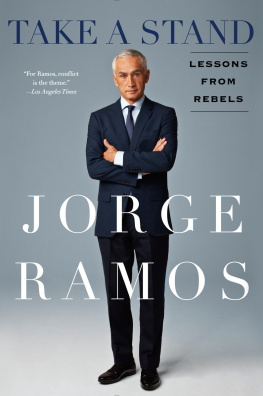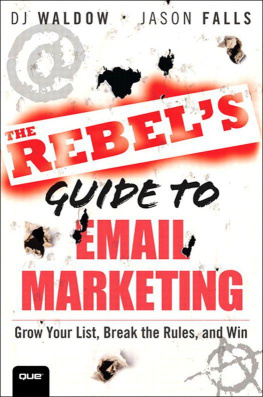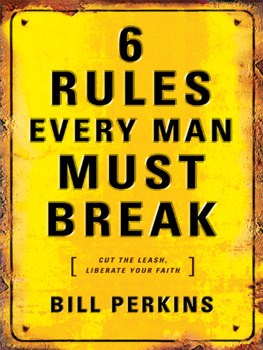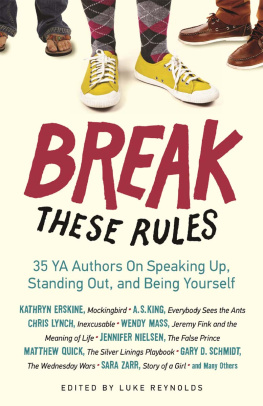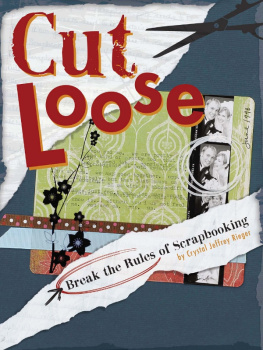Table of Contents
Landmarks
Great things are done by a series of small things brought together.
VINCENT VAN GOGH
In February of 2016, Harvard Business Review approached me to see if I was interested in being part of an experiment to test ideas about what a digital article of the future might look like. Experiment? I thought: I am in. In the end, the feature included videos, case studies, and even a live event in San Francisco, all focused on the idea that acts of rebellion could be positive and productive. The enthusiastic response we received kindled my desire to write the book you hold in your hands today.
At HBR, I worked closely with Senior Editor Steve Prokesch, who held my hand through the process, asking insightful questions, giving candid feedback, and making everything I wrote more compelling with his thoughtful edits and clever suggestions. I am so grateful for all of his outstanding help. Thank you also to HBRs Scott Berinato, Amy Meeker, Sarah Cliffe, Amy Bernstein, Gretchen Gavett, Tina Silberman, Karen Player, Kate Adams, Amy Poftak, and Editor-in-Chief Adi Ignatus. Their creative ideas, encouragement, and willingness to try new things were thoroughly invigorating. I want to express my gratitude to the entire HBR organization.
When I first wrote Rebel Talent , the ideas were clear in my head. Or so I thought. I was getting ready to submit the manuscript and shared it with a journalist, Gareth Cook, for a look. I ended up rewriting every chapter thanks to his incredibly helpful feedback and ingenious guidance. I wrestled through each idea in the book with him, and I am grateful for his patience, high standards, and rare ability to shape ideas into much better ones. I thought I had met a book doctor, but I ended up working with an astoundingly curious and sharp idea coach who cared about the project as much as I did. Thank you, Gareth, for seeing the potential in my ideas, for pushing me (so, so) hard to make them better, and for keeping me on track despite all the uncertainty about where this adventure would take me.
A big thanks also to my agent, Max Brockman, who saw promise in this project when the book was just a notion. Max provided insightful advice as I chose the right publisher, and he was a pleasure to work with even when my decisions gave him a headache.
I was joined in this journey by my brilliant editor, Jessica Sindler, at Dey Street, who read through many drafts of this book and always found ways to strengthen it with her thoughtful feedback and careful edits. Jessicas excitement for the book kept me motivated throughout the process, and I feel fortunate to have found her.
I owe an enormous debt to my friend, the writer and editor Katie Shonk, who read every chapter many times and suggested edits that made the writing much clearer and more compelling. Her wise advice along the way was invaluable, and her willingness to provide so much help speaks to the kind attitude I have benefited from over the many years Ive known her.
The research and stories reported in this book are based on many hours spent reading papers and books, hundreds of interviews, countless plane rides, dozens of visits to organizations around the globe, and thousands of conversations with colleagues, executives and friends. I am fortunate Ive had the opportunity to collaborate on the research mentioned in this book with such exceptional scholars: Linda Argote, Dan Ariely, Emma Aveling, Silvia Bellezza, Ethan Bernstein, Alison Wood Brooks, Daniel Cable, Tiziana Casciaro, Tiffany Chang, Giada Di Stefano, Molly Frean, Adam Galinsky, Evelyn Gosnell, Adam Grant, Paul Green, Brian Hall, Karen Huang, Laura Huang, Diwas KC, Anat Keinan, Tami Kim, Ata Jami, Li Jiang, Maryam Kouchaki, Rick Larrick, Julia Lee, Joshua Margolis, Julia Minson, Ella Miron-Spektor, Bill McEvily, Mike Norton, Gary Pisano, Jane Risen, Ovul Sezer, Juliana Schroeder, Maurice Schweitzer, Morgan Shields, Sara Singer, Brad Staats, Juliana Stone, Thor Sundt, Leigh Tost, Mike Yeomans, Kathleen Vohs, Cameron Wright, Evelyn Zhang, and Ting Zhang. The research that brings so much joy to my life is thanks to all of youto the dedication you have for science, your unsparingly honest feedback, your seemingly bottomless well of creative ideas.
For raising questions about rebels I had not thought about, and for providing a delightful environment in which to work, I am extremely thankful to my colleagues in the Negotiation, Organizations and Markets Unit at HBS: Max Bazerman, John Beshears, Alison Wood Brooks, Katherine Coffman, Ben Edelman, Christine Exley, Jerry Green, Brian Hall, Leslie John, Jenn Logg, Mike Luca, Deepak Malhotra, Kathleen McGinn, Kevin Mohan, Matthew Rabin, Joshua Schwartzstein, Jim Sebenius, Guhan Subramanian, Andy Wasynczuk, and Ashley Whillans. I am so lucky to have an office on the same floor as you, and to have the opportunity to keep on learning from you.
The inspiration for this book came from the many rebels Ive met throughout the years. I am especially grateful to Chef Massimo Bottura, his wife, Laura Gilmore, as well as Giuseppe Palmieri, Alessandro Lagan, Enrico Vignoli, and the rest of the remarkably talented and joyful crew at Osteria Francescana. I am thankful to Ed Catmull at Pixar for spending a big chunk of his birthday to speak with me; his keen intellect, thirst for learning, and contagious humility are the perfect combination for a truly engaging conversation. I am also grateful to Captain Sully, Scott Cook, Greg Dyke, Doug Conant, Rachael Chong, Pete Docter, Andrew Gordon, Dan Scanlon, Jonas Rivera, Jamie Woolf, Patricia Fili-Krushel, Leila Janah, Mellody Hobson, Andrew Roberts, Peter Leeson, Riccardo Delleani, and all of the other remarkable people who generously made themselves available for interviews and on-site conversations. Their wealth of knowledge, innovative insights, and approach to life left an indelible impact on my thinking.
For help connecting to rebels, I thank Gianni Lorenzoni, Sally Ashworth, Gareth Jones, Bruno Lamborghini, Avi Swerdlow, Anthony Accardo, Mike Wheeler, Taylor Luczak, Sarah Green Carmichael, and Kathleen McGinn.
I also want to acknowledge the precious help I received from research associates and fact checkers, who worked under time pressure with much good cheer, including Susan Chamberlain, Rijad Custovic, Ivan Dzintars, Annisha Simpson, Cam Haigh, and Leoul Tekle. Jeff Strabones careful work on the Notes likely drove him crazy, but I am grateful to him for being so attentive and precise. Alex Caracuzzo, Jeffrey Cronin, Barbara Esty, and Rhys Sevier, who are all part of Baker Library Services at HBS, worked their magic in finding information on anything I asked about, whether it was a history of the New Yorks Hippodrome Theater, or details on the techniques used across the centuries to cut diamonds. Thank you for being so responsive to my dozens of requests, even when many of them had last request in the subject line. Along the way, I was aided enormously by my faculty support specialist, Meg King, who not only patiently read various drafts of this book but also dealt with all sorts of last-minute requests with such graciousness. Without Megs support, my life at work would be complete chaos.
I refined many of this books ideas in classrooms, with hundreds of executives. I am thankful for their insightful feedback and comments, which shaped my thinking as I learned more about rebel talent. For the many opportunities I had to be in front of executives in Executive Education Programs at HBS, I owe a large debt to David Ager, Cathy Cotins, Jim Dowd, Pam Hallagan, Deborah Hooper, Ani Kharajian, Beth Neustadt, Carla Tishler, and many HBS colleagues who gave me the privilege to share my ideas in the classroom.
When I was ready for feedback, Judith Schaab, Carmen Reynold, and Gary Pisano were generous with their time and attentively read every page. I know how precious your time is, and I appreciate that you spent some of it offering ways to improve the manuscript. Thanks also to Elizabeth Sweeny, who read so many versions of the Introduction that I lost count, and yet still always had ideas on how to sharpen it.

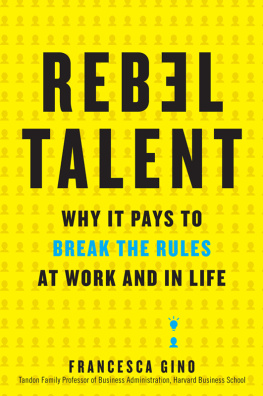
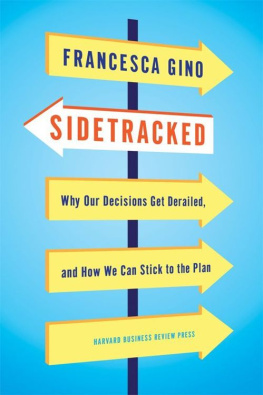

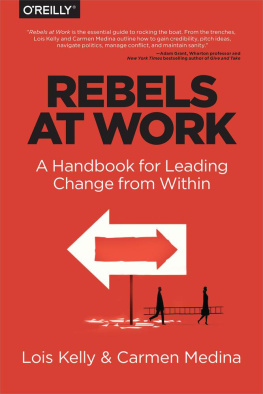
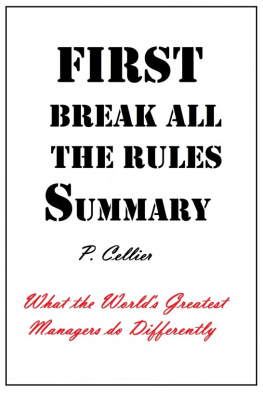
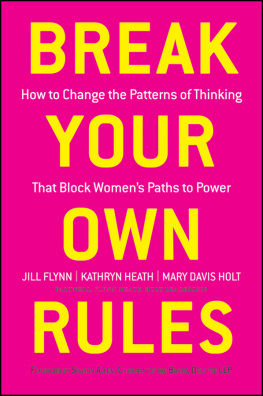
![Lois Kelly - Rebels at work: [a handbook for leading change from within]](/uploads/posts/book/215816/thumbs/lois-kelly-rebels-at-work-a-handbook-for.jpg)
